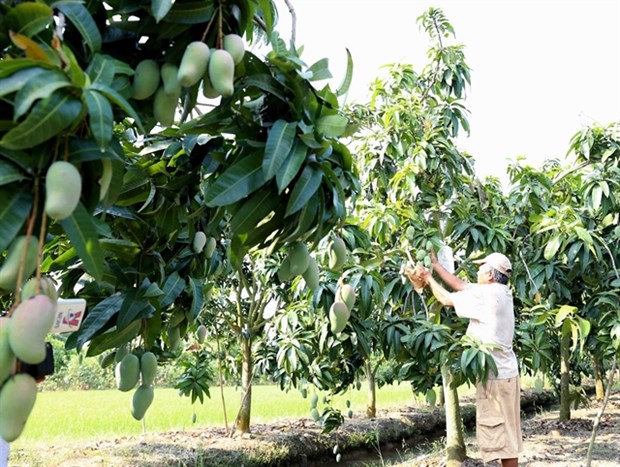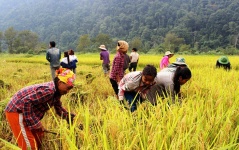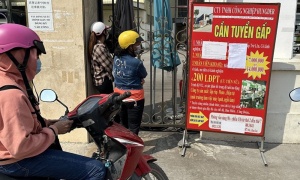An Giang province to train 12,000 rural labourers this year
The Mekong Delta province of An Giang plans to provide vocational training for 12,000 people living in rural areas this year and jobs for 80 percent of them subsequently, according to the provincial Department of Labour, Invalids and Social Affairs.

It will spend about 14.5 billion VND (624,000 USSD) to organise 469 training courses.
There will be 200 courses related to agriculture for 5,000 trainees and 269 non-agricultural courses for the remaining 7,000.
Pham Son, Deputy Director of the Department of Labour, Invalids and Social Affairs, said the focus would be on providing vocational skills to people who really need them and based on policies that are in place.
The department would get each locality to check the demand for vocational training there and demand for skilled workers, he said.
Son said, in providing agricultural vocational skills, the province will focus on expanding training courses that have been proven effective. The courses will be organised at companies, craft villages and specialised farming areas.
The province plans to focus on vocational skills that are needed by local businesses so that trainees can easily find jobs.
To encourage people to participate in vocational training courses, the province will provide stipends of 2.5 – 6 million VND (107 – 257 USD) to women trainees and those with disability, are from ethnic or poor and near-poor backgrounds or are beneficiaries of the Government’s preferential policies, according to the department.
They will also be provided 30,000 VND (1.3 USD) a day for food. They are also provided 300,000 VND (13 USSD) for transport during the course if they live more than 15km from the vocational training centre.
After the courses finish, the trainees will be provided soft loans for agriculture or doing business.
An Giang has 22 vocational training establishments that offer training in 15 agricultural occupations and 48 non- agricultural ones.
Last year, the province organised 461 vocational training courses for 12,000 rural residents and 80 percent of them have since found jobs.
In collaboration with eight local companies it provided vocational training based on their requirements to 1,955 people, and more than 90 percent of them were hired to work by those enterprises.
The province has created vocational training models that also create jobs for trainees like breeding freshwater aquatic creatures, cultivating rice-straw mushroom, growing vegetables in net houses, and breeding cows and oxen. They have proven effective and have potential for further development./. VNA
There will be 200 courses related to agriculture for 5,000 trainees and 269 non-agricultural courses for the remaining 7,000.
Pham Son, Deputy Director of the Department of Labour, Invalids and Social Affairs, said the focus would be on providing vocational skills to people who really need them and based on policies that are in place.
The department would get each locality to check the demand for vocational training there and demand for skilled workers, he said.
Son said, in providing agricultural vocational skills, the province will focus on expanding training courses that have been proven effective. The courses will be organised at companies, craft villages and specialised farming areas.
The province plans to focus on vocational skills that are needed by local businesses so that trainees can easily find jobs.
To encourage people to participate in vocational training courses, the province will provide stipends of 2.5 – 6 million VND (107 – 257 USD) to women trainees and those with disability, are from ethnic or poor and near-poor backgrounds or are beneficiaries of the Government’s preferential policies, according to the department.
They will also be provided 30,000 VND (1.3 USD) a day for food. They are also provided 300,000 VND (13 USSD) for transport during the course if they live more than 15km from the vocational training centre.
After the courses finish, the trainees will be provided soft loans for agriculture or doing business.
An Giang has 22 vocational training establishments that offer training in 15 agricultural occupations and 48 non- agricultural ones.
Last year, the province organised 461 vocational training courses for 12,000 rural residents and 80 percent of them have since found jobs.
In collaboration with eight local companies it provided vocational training based on their requirements to 1,955 people, and more than 90 percent of them were hired to work by those enterprises.
The province has created vocational training models that also create jobs for trainees like breeding freshwater aquatic creatures, cultivating rice-straw mushroom, growing vegetables in net houses, and breeding cows and oxen. They have proven effective and have potential for further development./. VNA
Tags:
-
 Over 10,000 women and children in Ninh Thuận and Cà Mau access clean water and better livelihoods
21-02-2025 14:36 01
Over 10,000 women and children in Ninh Thuận and Cà Mau access clean water and better livelihoods
21-02-2025 14:36 01 -
 Promoting labor cooperation between Vietnam and the Province of Saskatchewan (Canada)
18-02-2025 15:18 18
Promoting labor cooperation between Vietnam and the Province of Saskatchewan (Canada)
18-02-2025 15:18 18 -
 Multidimensional poverty rate nationwide drops to 4.06% in 2024
12-02-2025 15:45 16
Multidimensional poverty rate nationwide drops to 4.06% in 2024
12-02-2025 15:45 16
-
 9 in 10 Vietnamese consumers say a healthier diet is important to support mental and physical health – Herbalife Asia Pacific survey
26-12-2024 13:52 47
9 in 10 Vietnamese consumers say a healthier diet is important to support mental and physical health – Herbalife Asia Pacific survey
26-12-2024 13:52 47 -
 International migrants are vital force in the global labour market
19-12-2024 14:25 00
International migrants are vital force in the global labour market
19-12-2024 14:25 00 -
 2024 Vietnam Labour Day in Japan held
11-12-2024 11:02 18
2024 Vietnam Labour Day in Japan held
11-12-2024 11:02 18
- Herbalife Vietnam won the Corporate Social Responsibility Recognition Award by AmCham for the seventh consecutive year
- Herbalife Vietnam Expands Casa Herbalife Program to 15 Locations Nationwide To Help Improve Daily Nutrition For People In Need
- Deputy Minister Le Van Thanh received the Director of the Global Better Work Program











